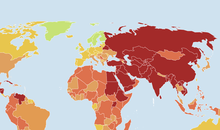
 Flash News
Flash News
Kosovo opens embassy in Malaysia
At first he ridiculed them as 'flying carpets' and then he adopted them/ 7 themes and promises that Edi Rama copied from Sali Berisha in this campaign
Edi Rama's return to the (losing) 2011 campaign
The US withdraws from peace negotiations between Ukraine and Russia.
Vice President Vance's statement distributed by the American Embassy: Where did he say it, in what context, and how does it relate to Albania?
Paris, Berlin urge Warsaw to abide by EU law after Budapest welcomes 'nuclear' decision

The dispute over the decision of the Polish Constitutional Court that the country's laws take precedence over those of the European Union provoked reactions, as Hungary, France and Germany came out in support of different parties.
The Polish decision drew hasty condemnation from the EU executive and the main parties in the European Parliament. One commentator described it as a "nuclear attack on the EU legal order".
It also raised fears about a "Polex". The initiative was initiated by Prime Minister Mateusz Morawiecki as part of the ongoing dispute over the rule of law challenging Warsaw and Brussels after the European Court of Justice ruled earlier this year that the country's mechanism for disciplining judges would violate EU rules and ordered his suspension.
Paris and Berlin backed Brussels through a joint statement in which they affirmed that "membership in the European Union goes hand in hand with full and unconditional observance of common values and rules."
The statement by French and German foreign ministers Jean-Yves Le Drian and Heiko Maas respectively came a day before Hungarian Prime Minister Viktor Orban signed a government resolution welcoming the decision of the Polish constitutional court.
In the resolution, the Hungarian government calls on EU institutions to respect the sovereignty of the bloc's 27 member states, Orban spokesman Bertalan Havasi told the Hungarian news agency MTI.
The Hungarian resolution says that the poor practices of the EU institutions, which disregard the principle of delegation of powers, prompted the Polish court to consider the issue of legal priority.
"The priority of EU law should be applied only in areas where the EU has competence, and the framework for this is set out in the founding treaties of the EU," the Hungarian document reads.
The resolution also states that the EU institutions are obliged to respect the national identities of the member states. National law enforcement agencies, in particular the courts and the Constitutional Courts, have the right to consider the scope and limits of the EU's powers, she says.
Source: Euronews
Latest news


Kosovo opens embassy in Malaysia
2025-05-02 22:21:37





Analysis: Why is EU-Ukraine trade at risk of becoming less free?
2025-05-02 20:54:39


Refused asylum in Italy, 15 migrants sent to Gjadri camp
2025-05-02 20:30:04
Edi Rama's return to the (losing) 2011 campaign
2025-05-02 20:22:18
Moments of panic in Stuttgart/ Car "runs" into crowd of citizens
2025-05-02 20:02:06


Berisha: Rama travels twice as much as the US president
2025-05-02 19:00:58

Phoebe Gates accidentally reveals that Bill Gates has Asperger's syndrome
2025-05-02 18:45:02


US against "birth tourism": Parents who abuse tourist visas risk entry ban
2025-05-02 18:09:59

Elona Lalaj appointed General Director of Tirana Municipal Police
2025-05-02 17:33:39



Nallbati challenges SP opponents to a public debate in the center of Devoll
2025-05-02 16:53:26
The US withdraws from peace negotiations between Ukraine and Russia.
2025-05-02 16:42:13
Zodiac signs that always know when you're lying to them
2025-05-02 16:27:17


Trump makes changes to his inner circle
2025-05-02 15:56:38
Fire in an apartment on "Tish Daija" street in Tirana
2025-05-02 15:41:27

Who can stop the price increase?
2025-05-02 15:08:52


Trump makes changes to his inner circle
2025-05-02 14:34:04
Theft at Korça hospital, nurse and patient robbed
2025-05-02 14:33:14
Hotolisht residents warn Rama-Balluk: Either us or you
2025-05-02 14:21:58
May 11th Elections, US Embassy in Tirana distributes JD Vance's message
2025-05-02 14:07:14
Germany declares AfD party an extremist group
2025-05-02 13:59:52



Begaj hosts King Abdullah II of Jordan with a state ceremony
2025-05-02 13:10:20

Italian MP: Vote for a great man like Berisha to change your destiny
2025-05-02 12:53:19
Florenc Çapja extradited from Dubai today
2025-05-02 12:39:21
Berisha: Every village will have the infrastructure of city neighborhoods
2025-05-02 12:30:53


For a month in Albania, the tourist couple appeared happy on social networks.
2025-05-02 12:04:09
Bozdo meeting with farmers in Dimal: DP commits to real support for agriculture
2025-05-02 11:53:43
Diaspora for a Free Albania reports Belinda Balluku to SPAK
2025-05-02 11:41:15
British Lord Supports DP in Elections: It's Time for Change in Albania
2025-05-02 11:32:48

Anti-drug operation in Belgium, Italian-Albanian gang destroyed
2025-05-02 11:10:36


Murder in Shkodra, tourist stabs wife to death, shoots himself
2025-05-02 10:33:08
Compulsory insurance: Risk premiums between companies vary by up to 82%
2025-05-02 10:21:22
The DP electoral office in Cërrik is robbed
2025-05-02 10:11:07

Under investigation in Erion Veliaj's file, Ajola Xoxa appears before SPAK
2025-05-02 09:49:42
Hostage-taking and extortion, two young men extradited from Germany and Italy
2025-05-02 09:42:58
Reporters Without Borders: Deterioration of media freedom in Kosovo
2025-05-02 09:29:40
The DP headquarters in Cërrik was robbed during the night
2025-05-02 09:12:45

Olive oil remains in stock again, exports drop 75% for the period January-March
2025-05-02 08:49:08
Foreign exchange, the rate at which foreign currencies are sold and bought
2025-05-02 08:41:51
Early signs of dementia in young people in their thirties that are often ignored
2025-05-02 08:37:46

Horoscope, what do the stars have in store for you today?
2025-05-02 08:17:26
High temperatures, thermometer marks 31 degrees Celsius
2025-05-02 08:04:18
Posta e mëngjesit/ Me 2 rreshta: Çfarë pati rëndësi dje në Shqipëri
2025-05-02 07:49:13

DP candidate: Patronage agents follow us in cars during electoral meetings
2025-05-01 22:40:28



Forza Italia MP: Only Sali Berisha as Prime Minister can lead Albania to Europe
2025-05-01 21:29:47

For those who were scared by Tomorr Alizoti
2025-05-01 21:05:21
Berisha challenges Rama: You promised free healthcare, come here and keep it!
2025-05-01 20:56:58



The six best foods against stomach bloating
2025-05-01 20:04:09


Zelensky: We want peace, Russia responds with attacks
2025-05-01 19:22:07

Berisha: The contract in the US is not just for the DP, but for every Albanian!
2025-05-01 19:08:14
Fight between teenagers, 15-year-old ends up in hospital
2025-05-01 18:44:17




